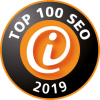International SEO
INTERNATIONAL MARKET SHARES OF SEARCH ENGINES
By far, the most visited search engine is Google. With a worldwide market share of currently about 90%, the market leader clearly surpasses all other search engines. In some countries, Bing and Yahoo achieve partly different market shares. For example, Bing has a market share of around 10 percent in Germany and the USA. Only in four countries, does Google not boast a market-leading position. Starting in China, the search engine Baidu is clearly in the lead here with over 50 percent. As an exception to the rule, Google does not play almost any role in China.
BETTER RANKING THROUGH APPROPRIATE SEARCH TERMS
In order to find the information they are looking for as quickly as possible, Google users only pay attention to the first search results page. Hardly anyone clicks on the search results on the second page.
Thus, mostly only the first organic hits are clicked. What search terms can improve search engine ranking? To achieve a higher ranking, proper search engine optimization must be combined with relevant search terms. Long-tail search terms are the most likely to lead to success.
KEYWORDS INTERNATIONALLY
A keyword analysis abroad works differently than in your country. Queries entered into the search engine differ from country to country. Even in countries with the same language, they sometimes vary enormously. Keywords should, therefore, be translated more than literally. Wrong sources for the translation of the website consequently lead to an incorrect keyword selection.
Keywords should be designed on websites with other languages so that search engines in the selected destinations evaluate them as particularly relevant and thus rank far ahead.
SELECTING THE RIGHT TOP LEVEL DOMAINS
There are 3 different ways for Google to recognize the origin of a website. Often the selection of the top-level domain matching the country is useful. There are country-specific top-level domains. (E.g., .de for Germany or .fr for France). From the search engine’s point of view, this domain concept is usually highly rated and therefore has high relevance.
The next possibility would be the country-specific subdomain [de.musterdomain.com or fr.musterdomain.com].
Every country-specific subdomain creates its links, which are distinguished by the country code at the beginning of the subdomain, such as “fr.” This spelling of the subdomain is not commonly used. It differs from the common use of “www” input.
Another option for a domain concept is sub-directories, like [www.musterdomain.com/de or www.musterdomain.com.fr]
For companies without link-building resources in their country, it is recommended to select this domain type. This is because sub-directories will benefit from the strong link of the main domain as they are on the same domain. If brand awareness is high and local resources are available, top-level domains would be a better choice. For newly launched websites abroad, it is ideal to have local resources for link building to improve the chance of ranking higher.
INTERNATIONAL ON-PAGE AND OFF-PAGE OPTIMIZATION
ON-PAGE
On-page optimization includes all activities that are done on the website. The optimization of headlines, high-quality content, image descriptions, or internal page linking. These help the website achieve a higher ranking in the search engines. Besides textual content, it is mainly about structural and technical optimization.
OFF-PAGE
Off-page optimization refers to all measures that do not occur on a website. It is still about links from other websites to a website. Here, however, attention must be paid to qualitative backlinks. Unlike on-page optimization, which website operators directly control, off-page optimization involves building link structures between different websites to increase clicks and improve ranking.
DUPLICATE CONTENT
It is uncommon to create a unique page for each language version of a website. Typically, the same content is used for multiple countries, such as England and the USA, resulting in duplicate content across different URLs within the website.
To avoid this, there are technical solutions. Original and duplicate pages can be recognized by Google through special designations and thus correctly assigned. The problem of duplicate content is thus solved, and texts can be used in several country versions without any problems.
TIPS FOR INTERNATIONAL SEARCH ENGINE OPTIMIZATION
- Location information should be taken into account and submitted
- Try to minimize unimportant external links on your page
- Use the right keyewords that match your offer
- Translations and copywritin must be done by professionals, ideally "native speakers"
- Pay attention to the right titles












